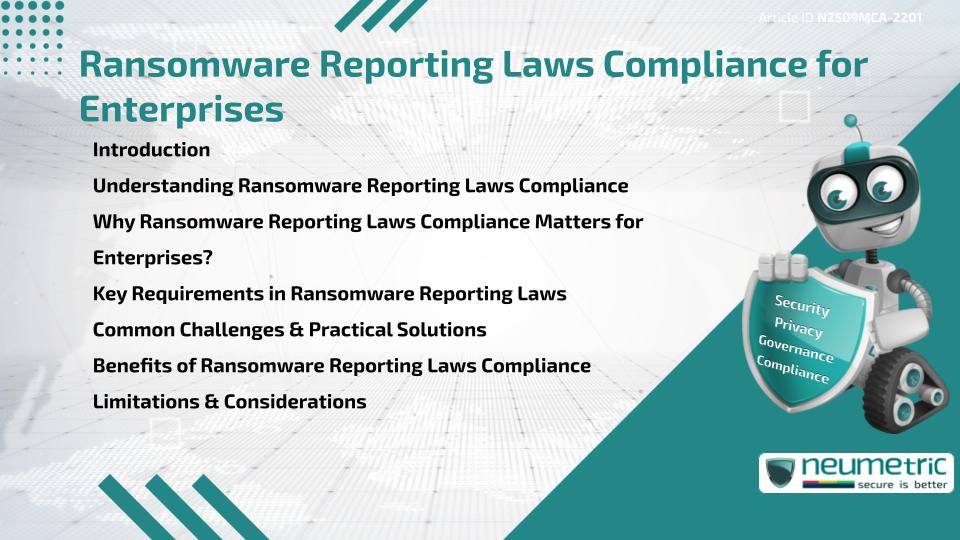Table of Contents
ToggleIntroduction
The rise of Ransomware Attacks has driven Governments Worldwide to introduce mandatory Reporting Laws. Ransomware Reporting Laws Compliance ensures Enterprises disclose Attacks promptly to Regulators, enabling faster Incident Response & Improved Sector-wide Resilience. This Article explains the concept, why it matters, key requirements & benefits for Enterprises.
Understanding Ransomware Reporting Laws Compliance
Ransomware Reporting Laws Compliance refers to meeting Regulatory obligations to notify Authorities about Ransomware Incidents. These Laws are designed to enhance Transparency, improve Data sharing & help Governments coordinate responses to Cybercrime.
Compliance may require Enterprises to report Attacks within specific timeframes, provide Incident details & cooperate with Regulators. For example, the United States mandates Reporting to the CyberSecurity & Infrastructure Security Agency [CISA], while the European Union enforces Reporting under the Network & Information Systems Directive [NIS2].
For more details, see CISA Ransomware resources.
Why Ransomware Reporting Laws Compliance Matters for Enterprises?
Enterprises often hesitate to disclose Ransomware Attacks due to Reputational concerns. However, Ransomware Reporting Laws Compliance matters because it:
- Ensures Legal & Regulatory adherence.
- Helps mitigate Penalties for Non-disclosure.
- Supports Industry-wide intelligence sharing.
- Builds trust with Regulators, Customers & Business Partners.
The ENISA CyberSecurity reports emphasise mandatory Reporting as a Tool for collective resilience.
Key Requirements in Ransomware Reporting Laws
- Timely Notification – Many jurisdictions require Reporting within 24 to 72 hours of detection.
- Incident Details – Enterprises must disclose the nature of the Attack, Data Affected & Recovery Actions.
- Regulatory Engagement – Ongoing cooperation with authorities during Investigations.
- Sector-specific Rules – Financial Services, Healthcare & Critical Infrastructure often face stricter obligations.
- International Coordination – Cross-border organisations must comply with multiple Legal regimes.
The NCSC UK Ransomware guidance highlights these obligations for critical industries.
Common Challenges & Practical Solutions
- Unclear Regulations – Maintain Legal counsel to interpret varying National requirements.
- Short Reporting Timelines – Establish Incident Response Playbooks to accelerate Reporting.
- Reputational Risks – Use transparent communication strategies with Customers & Partners.
- Cross-border Complexities – Map Legal obligations across jurisdictions for Global Operations.
The ISACA Compliance resources provide additional support for managing these challenges.
Benefits of Ransomware Reporting Laws Compliance
- Regulatory Assurance – Reduces liability & demonstrates due diligence.
- Improved Preparedness – Strengthens Internal response processes.
- Collective Defence – Contributes to Sector-wide resilience against Ransomware.
- Trust & Transparency – Builds stronger relationships with Stakeholders.
Limitations & Considerations
Ransomware Reporting Laws Compliance does not prevent Attacks. Enterprises must invest in preventive Controls such as Backups, Patch Management & Employee Training. Additionally, Reporting obligations vary across jurisdictions, requiring constant monitoring & adaptation.
Takeaways
- Ransomware Reporting Laws Compliance ensures Enterprises notify Regulators promptly after Attacks.
- Requirements include timely Reporting, detailed disclosures & sector-specific obligations.
- Compliance enhances trust, reduces liability & strengthens resilience.
FAQ
What is Ransomware Reporting Laws Compliance?
It is the obligation for Enterprises to disclose Ransomware Incidents to Regulators within defined timeframes.
Why is it important?
It ensures Legal adherence, reduces penalties & contributes to collective Cyber Defence.
What are typical Reporting timelines?
Most Laws require notification within 24 to 72 hours of detecting an Attack.
Do Rules vary by Sector?
Yes, Industries such as Healthcare & Finance often face stricter requirements.
Does Compliance prevent Ransomware Attacks?
No, but it supports faster Recovery & Collective response.
References
- CISA – Ransomware Resources
- ENISA – CyberSecurity Reports
- NCSC UK – Ransomware Guidance
- ISACA – Compliance Resources
- IT Governance – Ransomware Compliance
Need help for Security, Privacy, Governance & VAPT?
Neumetric provides organisations the necessary help to achieve their CyberSecurity, Compliance, Governance, Privacy, Certifications & Pentesting needs.
Organisations & Businesses, specifically those which provide SaaS & AI Solutions in the Fintech, BFSI & other regulated sectors, usually need a CyberSecurity Partner for meeting & maintaining the ongoing Security & Privacy needs & requirements of their Enterprise Clients & Privacy conscious Customers.
SOC 2, ISO 27001, ISO 42001, NIST, HIPAA, HECVAT, EU GDPR are some of the Frameworks that are served by Fusion – a SaaS, multimodular, multitenant, centralised, automated, CyberSecurity & Compliance Management system.
Neumetric also provides Expert Services for technical Security which covers VAPT for Web Applications, APIs, iOS & Android Mobile Apps, Security Testing for AWS & other Cloud Environments & Cloud Infrastructure & other similar scopes.
Reach out to us by Email or filling out the Contact Form…


